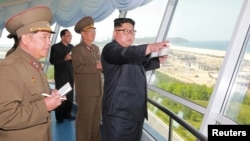The three generals North Korean leader Kim Jong Un moved into key positions before the Singapore summit with the United States are “fanatically devoted to the North Korean system and the Kim family’s leadership.”
Filling the top posts of the three main bodies of the North Korean People's Army (KPA) with loyalists signals Kim’s effort to prepare for any changes that North Korea might need to make as a result of the summit with President Donald Trump in Singapore on June 12, according to Ken Gause, director of the International Affairs Group at the Center for Naval Analyses.
“If Kim Jong Un is set on making peace with the U.S. and [South Korea] and dealing away at least part of the nuclear program, he will have to put the Korean People's Army’s influence in a box and keep it there,” said Gause. “This reshuffle has brought to the fore the officers who can do just that. They are loyal to Kim Jong Un and no one else.”
'Devoted to North Korean system'
Or as Michael Madden, founder and director of North Korea Leadership Watch and a North Korea expert at Johns Hopkins University's 38 North website, said, “Those guys generally … are fanatically devoted to the North Korean system and fanatically devoted to the Kim family’s leadership.”
Kim prizes loyalty and has taken a pitilessly practical approach to removing rivals. In 2013, he ordered the execution of his uncle, Jang Song Thaek, who was seen by many as an advocate for reform, with close ties to China.
Last year, his government was accused of orchestrating the assassination of his half brother Kim Jong Nam in Malaysia, who was reportedly under the protection of the Chinese.
Patrick Cronin, senior director for the Asia-Pacific Security Program Center for a New American Security, said that with the change of military leadership, Kim is seizing “the opportunity of the summit diplomacy” to bring those “Kim identified as more aligned with his thinking” into the top positions of power.
In charge of munition orders
No Kwang Chol, formerly the first vice minister of the KPA, was promoted and is now the minister of the North Korean Ministry of People’s Armed Forces (MPAF), which is responsible for KPA’s administrative and logistical tasks, processing munition orders, and diplomatic activities with foreign militaries.
Previously, No headed the Second Economic Committee that oversees defense production, including the nuclear and missile programs. He replaced Pak Yong Sik, who accompanied Kim to the inter-Korean summit on April 27.
Ri Yong Gil succeeded Ri Myong Su, returning as the army’s chief of the General Staff Department (GSD), a position he held from 2013 to 2017. The GSD oversees the operation of North Korea’s conventional military and special forces.
In charge of ideological indoctrination
Kim Su Gil was appointed director of the army’s General Political Bureau (GPB), the most senior position in the country. He replaces Kim Jong Gak. Kim Su Gil was the former chairman of the Pyongyang City Committee of the Workers' Party. The GPB handles a variety of activities, including ideological indoctrination, financial audits and financial regulation over economic activities.
South Korea’s Yonhap news agency reported the appointment of No and Ri Yong Gil, while Kim’s appointment was announced by North Korea state media, which was confirmed by South Korea’s Unification Ministry.
Madden said the military shake-up was probably initiated in the beginning of the year, but is only now taking effect because North Korea usually takes six months to make personnel changes, especially in the national security community.
“[North Korea] exercises with an abundance of caution in these things,” said Madden. “These are not magical, under-the-cover-of-the-night personnel appointments. These were in place at least for three months … or the beginning of the year.”
The changes in the top military posts align with a transition North Korea is making from nuclear weapons development to economic development. As Pyongyang shifts its policy and carries out economic reforms that were announced in the beginning of the year, the changes in the top military posts might have been necessary, according to Madden, who suggested that Kim wanted loyalists to oversee economic development projects that could employ thousands of people.
“I think North Korea has reached its internal benchmark,” said Madden. “I think they have exceeded their internal benchmark in the development of an incredible nuclear deterrent that they are now focusing on the economy.”
Military modernization
Using the military to carry out economic activities such as large construction works is not unusual for North Korea, according to Madden. Such a practice dates to the late 1980s when the policy of military modernization was put in place.
The goal was, first, to develop ballistic missiles and nuclear weapons; second, to continue the expansion and development of asymmetrical threats such as cyberwarfare and special operation forces; and third, lay off some of the country’s military personnel who were then detailed to work on projects for civilians.




